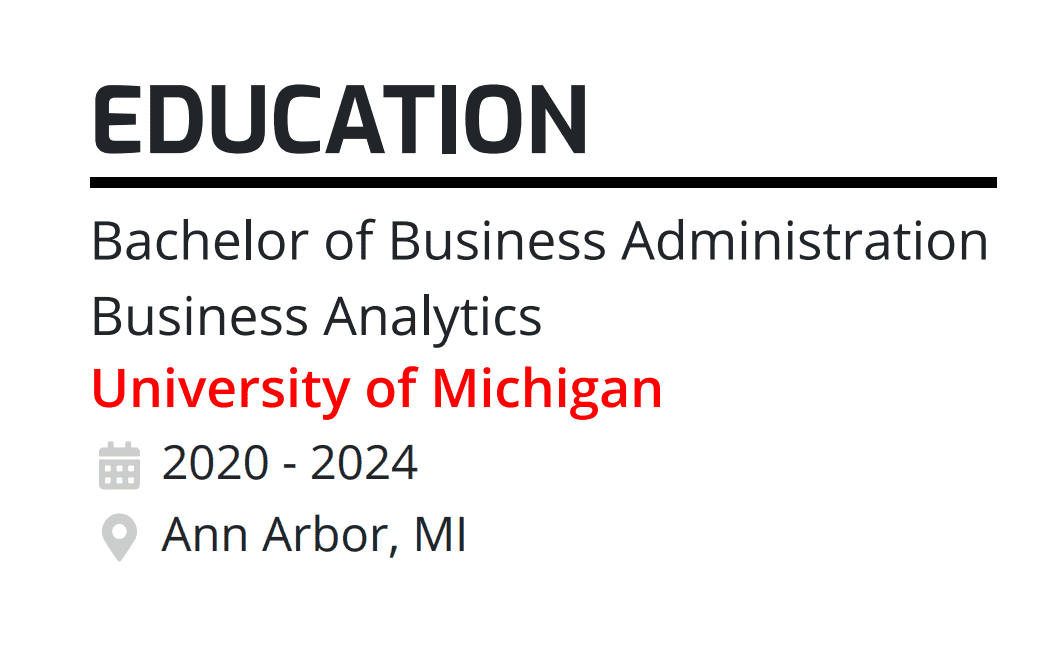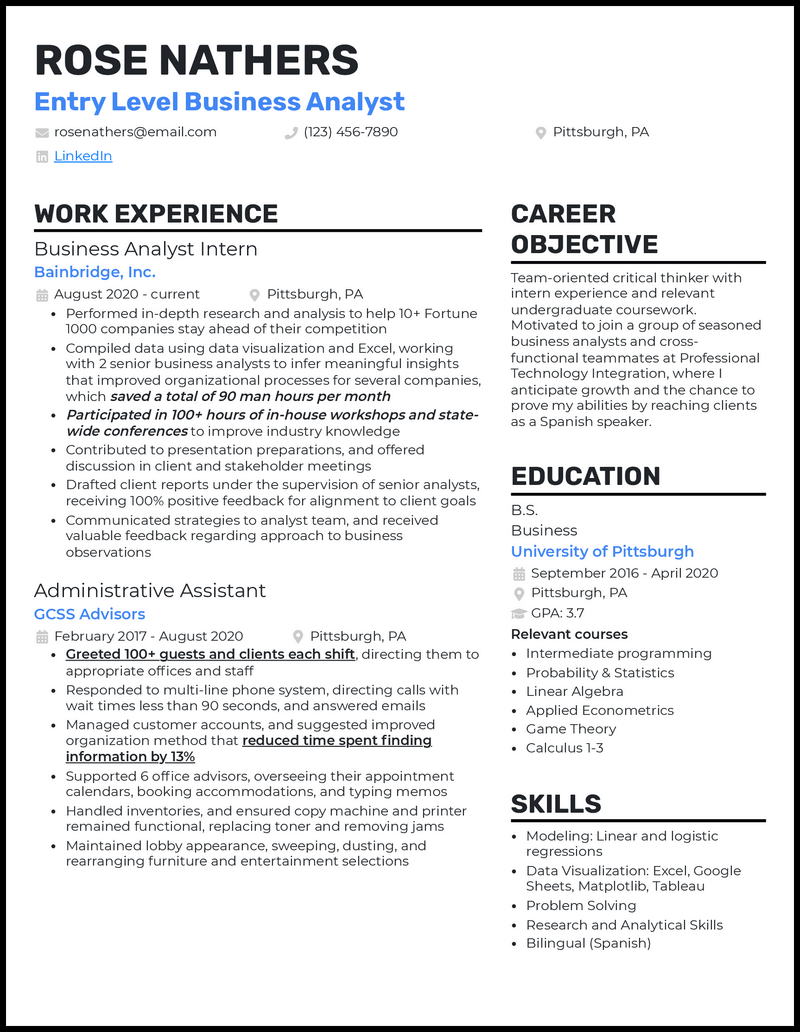Does the business’ current strategy align with the company’s value and goals? Do all technology integrations and data documentation systems provide optimal solutions? You’re there to support other data analysts in making sure all this—and more—is covered!
But you might still have some questions about writing a cover letter and resume. How do you truly highlight your data analytics qualifications? How can you make a resume stand out?
We’ve got this! With these 15 entry-level business analyst resumes and seasoned advice we’ve put together after years of helping people in your field, you’ll be ready to roll.
Why this resume works
- With no corporate experience in hand, your career objective is going to be the prologue of your entry-level business analyst resume.
- Begin by talking about any projects/internships you’ve completed so far along with your best education qualifications. Use Rose’s strategy to mention relevant courses with phrases like relevant undergraduate coursework and finally introduce your primary goal at your new company like a well-thought climax.
How to Write an Entry-Level Business Analyst Resume

SUmmary
Kickstart your entry-level business analyst resume by tailoring a compelling objective, showcasing relevant projects or internships, highlighting your degree and certifications, and formatting it for maximum impact and ATS compatibility.
As an aspiring business analyst, your first step should be writing a resume that leaves no doubt about your potential. Without relevant and direct work experience, you can lean on your understanding of business processes, critical thinking, data interpretation, and ability to work alongside others. Some of the top things employers would expect from you are knowledge of tools such as SQL, Tableau, and Excel, and how you can use them to solve real business problems.
As long as you can showcase your transferrable skills and some relevant experience from workshops, practical coursework, internships, and projects, you’re closer to getting the job than you think.
Not sure how to begin? Explore proven resume examples tailored for aspiring business analysts to guide your structure, tone, and content.

Set a great tone with a compelling objective
Let’s be real, if you know how to present and sell a business, then you must know how to sell your own profile. We’re not talking over-the-top resume introductions that say “There ain’t no business analyst like me,” but something more grounded in reality.
A 3–4 line career objective is going to be one of the most important aspects of your resume, so you don’t want to miss your chance to blow. Be natural, but don’t undersell. Check the job description and craft some tailored statements.
Not sure what we mean? Here’s a more practical example:
Meet John, who is applying to be an entry-level business analyst at a company that mentions three main requirements in the job description:
- Recent graduate with a business degree.
- Proficiency in Power BI, SQL, and Microsoft Excel
- A drive to learn more strategies
Here’s a bad example of John’s initial career objective:
Bad example
“I am a very motivated individual who is seeking an entry-level business analyst role in your company. My communication and problem-solving skills will surely benefit your development team in driving sales.”
Notice something? Not a single line is tailored to the job description. Heck, a 12-year-old with ChatGPT can produce something better (although we came up with this bad example ourselves!).
Now, check out the career objective that actually lands him an interview:
Good example
“Recent MBA graduate with high-level proficiency in SQL, Excel, and Power BI and project experience in driving ticket sales for a university fair, seeking an entry-level business analyst role at Tesla. Eager to shadow team leaders and learn more about evaluating consumer trends.”
What can we really say about this one? It’s tailored, specific, and makes John an instantly better candidate than most of the other applicants.

Be precise with your contact information
The last thing you want to do is have a typo right in the beginning. Revisit your personal details section and make sure it includes:
- Job title
- First and last name
- Professional email
- Personal phone number
- LinkedIn (optional)
Also, include multiple contact details. You may not always check your email so it’s best to have your phone number included, too.

Projects/internships are your job experience substitutes
Now that your contact info’s spot-on, let’s shift focus to what you bring to the table. Remember when we said an objective is just one of the many important aspects of your resume? Well, meet the other side of the coin—your projects. With no actual work experience, they are like your next best option.
Although, we don’t recommend shying from adding any actual experience you may have accumulated in college. If you have any related job, add it in .However, since most graduates only have project or internship experience, they need to make the most of it.
Remember, even for projects you have to quantify the impact you made, which by the way can improve your chances of getting hired by 8%.
If you have anything that is even remotely relevant to the projects/internships below, it’s worth a shot.
- College team project
- Did you lead a team to analyze a hypothetical business and its revenue trends? What did you find was the most efficient method and/or tools in the process?
- Helping the community
- Have you ever lent a hand to support a local non-profit or charity drive? Include any details of what findings you presented and how they helped them shape their efforts for future donations/grants.
- Internship
- The role name doesn’t matter as long as it’s business-related. Just be sure to write about how you supported the team and your overall contributions.

Demonstrate transferrable skills
Think hard! In terms of your skills, we mean. Business analysis is a pretty technical field, so you’ll focus on hard skills for your resume. Save softer interpersonal abilities for rounding off your experience section.
You want your skills list to be extremely relevant to your profession, so leave out anything generic that could be applied broadly across most fields. In other words, ditch stuff like “communication” and “data entry.” Mention linear regressions instead.
The best skills you can list will be software-related, so out things like Matplotlib by name. We meant it when we said “specific.”
Check out some ideas from our best resume samples:
Best entry level business analyst skills
- Linear Regressions
- Logistic Regressions
- MS Excel
- Matplotlib
- Tableau
- Problem-solving
- Data Research
- Google Sheets
- Bilingual (Spanish)

Sample entry level business analyst work experience bullet points
Okay, so maybe there was one “exception” in there. Being bilingual doesn’t necessarily relate to business analysis on its own, but it provides something invaluable for an entry-level business analyst resume: Unique, qualifying context!
Recruiters want to see examples of how you’ve applied your set of skills within your field. Or, if your prior experiences weren’t in business analysis, they want to see your ability to analyze and hand-pick experiences that utilized overlapping skills like MS Excel or Tableau and made you more versatile.
And don’t forget: Back those claims up! Just like an Excel spreadsheet, your resume is going to look awfully blank without numbers to quantify your statements. Include quantifiable metrics of the impact you’ve had with your skills.
Here’s what we mean:
- Managed customer accounts and suggested improved organization methods that reduced time spent retrieving information by 13%
- Compiled data with data visualization techniques and Excel, working with senior analysts to infer meaningful insights that improved organizational processes for several companies, saving a total of 90 manual work hours per month
- Responded to multi-line phone system, directing calls with wait times less than 90 seconds, improving satisfaction ratings by 11%
- Performed in-depth research and analysis to help 14+ Fortune 1000 companies surpass their competitors by 7% or more
- Drafted client reports with supervision from senior analysts, receiving 99% positive feedback for alignment with client goals

Let employers know you’re job-ready with a degree
We’ll be brutally honest about one thing: this isn’t the tech field where having a degree isn’t always required if you’ve got the experience. Most business analyst (even entry level) job listings will specifically state you need a degree.
Rightfully so, because they know that learning how to sell a product and appeal to customers is a type of science, and it’s best learned in university. So add your best degrees to the front stage like:
- Bachelor of Business Administration
- Master of Business Administration
- Bachelor of Business Management Studies
- Bachelor of Economics
Now, don’t just blindly list them in your education section; be specific about when you got them and your college. Add your final GPA score if it’s above 3.5; otherwise, avoid mentioning it. Here’s what your final education section should look like:

Certifications: cherry on top, but worth it
This one’s not a dealbreaker but a good addition to your resume. Try listing any relevant certifications you’ve recently achieved, such as:
- Microsoft Office Specialist: Excel Expert
- Tableau Desktop Specialist
- Certified Associate in Project Management (CAPM)
- Bloomberg Market Concepts (better for those finance-based roles)
Once added, don’t forget to mention their date of issue and/or how long it’s valid. Follow the example below to understand how you should format your certification section:

Pro tip: Got multiple certifications? List them in reverse chronological order to show employers your latest coursework!

Formatting your business analyst expertise the right way
Now that you’re certain of everything you need to include in your resume, it’s time to learn presentation. Most modern employers use an application tracking system (ATS) to weed out generic candidates from the rest.
The way to beat it? Take a look at this list of some very basic things you have to get right:
- Resume length: Don’t rush your resume, and include every single detail of your life. Add all relevant information within one page.
- Concise work experience: Typically, it’s best to include only 4–5 bullet points, but since you’re probably going to have an objective, try playing around with that number to keep things clean and readable.
- Reverse-chronological format: Use a reverse chronological order while listing your project/internship experience to present your latest achievements at the top.
- File format: If the job description asks you to share your resume in a specific file format, follow it. Otherwise, send a PDF to be on the safe side.
- Besides your resume, see if the job description requires you to submit a cover letter. If you’re having trouble creating one, try using our cover letter generator to instantly craft a job-tailored application within seconds.
Top 5 tips for your entry-level business analyst resume
- Include niche skills
- We’re not talking about specificity this time—although that’s always important! Include skills, like bilingual abilities or less-common software tools like Orcanos or ReQtest, that demonstrate a unique specialization in your field.
- More on context:
- If you’re struggling to find a good way to mix up your metrics, look to context! Remember how we said the best home for your soft skills was actually your experience section? Take the opportunity to work interpersonal abilities like cross-departmental teamwork and receptiveness to feedback into your experience points.
- Metrics really do matter
- Try to use a variety of metrics if you can! Different types of quantifiable data like percentage-based improvements, error reduction rates, and decreased manual work hours can all measure your impact. Use data to show how you streamlined business operations (and keep your resume fresh)!
- Customize every time
- Don’t worry: It takes less work than you think. Just revisit the job ad and use those sharp analytical skills to pick out key values, objectives, and word choices. Switch these out to shift focus between your operations planning skills and your regressions prowess, depending on the individual job requirements.
- Try to streamline
- It can be tough when you have to pack context, technical operations, writing tone, and metrics all into one bullet point . . . but try your best to keep each point brief! Keep each bullet point at three lines or under, ideally one or two. Prompting ChatGPT to condense your resume can help you streamline each point like you’d polish up your data visualizations.
Entry-Level Business Analyst Resume FAQs

Include all projects, internships, and volunteer work you’ve done in college. More specifically, write how you used data analysis to bring out business impacts and mention the strategies/software you used to achieve them. The more quantified bullet points you have, the better.
Like we said before, stick to a one-page resume. Two pages are best suited for business analysts with tons of experience, and even then, it’s only recommended when the extra content adds value to your profile. Since you’re only starting out, one page is going to be plenty.
If you’re making a notable shift within your industry or aiming for a totally new role, then your resume might benefit from an objective statement. If you include one, make sure you mention special skills like Orcanos or contract negotiations and how they’ll benefit the company you’re applying to.
If you’ve just graduated, or if you’ve taken independent classes, include anything that’s relevant to your field! Credentials are credentials, after all, and your initiative to complete relevant courses only boosts your desirability and strengthens your Business or Data Analytics degree.
Words, like Analyzed, Documented, Mapped, Projected, Automated, Visualized, Assessed, and Optimized, are common choices for an entry-level business analyst resume. These are hard-hitting, impactful verbs and work best at the start of a sentence.
Here’s a list of all the common mistakes freshers typically make on their entry-level business analyst resumes:
✅Improper formatting
✅Lack of quantified bullet points
✅No career objective
✅Cluttered resume design
Follow our tips from the guide to avoid falling for them and shoot past 90% of the other applicants.
Some solid entry-level certifications for this role include the Google Data Analytics Certificate, Certified Business Analysis Professional (CBAP), Sean Six Sigma Yellow Belt, and Certified Analytics Professional (CAP). Make sure you add certificates that show your specific field of expertise like project understanding, tech-savviness, etc.




















